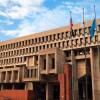Michelle Wu's name will appear first on the Nov. 2 ballot in Boston's race for mayor, and Annissa Essaibi George will appear second.
The order of the two Councilors was determined Monday by members of the Board of Election Commission randomly drawing names from the perforated bingo drum — an election season mainstay.
Perhaps more consequential is the ballot order for at-large councilor candidates. The four at-large seats will be selected from a pool of eight and top ballot billing, according to some political scientists, can offer an edge over other candidates.
David Halbert will top the list of eight competitors who emerged from a field of 17 earlier this month.
The order for At-Large councilors is as follows:
David Halbert
Bridget M Nee-Walsh
Julia Mejia
Carla Monteiro
Ruthzee Louijeune
Althea Garrison
Michael Flaherty
Erin J. Murphy
In the competitive district council races, Brian J Worrell will appear atop former state Rep. Evandro C. Carvalho in the competition to fill outgoing councilor and former mayoral candidate Andrea Campbell's seat in District 4.
In the race to fill outgoing Jamaica Plain councilor Matt O'Malley's seat in District 6, Kendra R. Hicks will top Mary Tamer on the ballot.
Roy A. Owens, Sr., will appear above Tania Fernandes Anderson in the race to fill Kim Janey's Roxbury council seat in District 7.
Dorchester incumbent Frank Baker will appear atop his rival Stephen McBride; Hyde Park incumbent Ricardo Arroyo will top his competitor John E. White; Brighton incumbent Liz Breadon will appear underneath her challenger Michael J. Bianchi.
Rounding out the November ballot are three ballot questions.
One binding question will ask voters whether Boston's budget process ought to give the council and voters more of a say in how Boston spends its money. The change would empower the council to make line-item revisions and outright veto a mayor's budget. It would also set up a process for voters to determine how Boston spends a small portion of the budget.
There are two additional non-binding questions: whether a high voltage electric substation should be built in East Boston, and whether the school committee, currently appointed by the mayor, should become an elected body.







